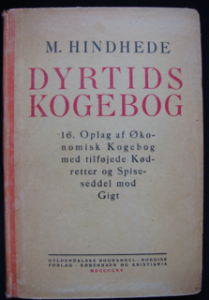This is not a foodie-blog type post, by the way. I’d call it a socio-political post (even though that sounds a bit pompous.) Anyway… I have a cute cookbook from 1915 called “Dyrtids Kogebog” that came from a flea market excursion.

Dyrtid is a Danish word that refers to a time of scarcity. I guess an appropriate translation would be “A cookbook for times of scarcity”. Basically, the cookbook focuses on a mainly vegetarian-type diet, especially meals based on grains. The author, Mikkel Hindhede, had the idea that much of the starvation that took place in the early 1900s was due to a misguided focus on raising animals for meat, rather than raising nutritious grains at a far, far lower cost than the animals. This was an interesting angle that I had never encountered previously.
Curious to learn more, I came across an article from the European Vegetarian Union’s newsletter in 1996, entitled “Vegetarian Experiment with a Population of 3 million”. It is a reprint of Mikkel Hindhede’s article from 1920, “The effect of Food Restriction on Mortality in Copenhagen during War”. During World War I, circumstances forced much of the Danish population to eat less or no meat. Hindhede looks at various statistics, admitting that some parts are not conclusive, for mortality and health.
In other words, could a move toward a more vegetarian-type diet help world health and reduce the level of starvation in the world today? This is truly food for thought.
PS This is also an example – in my opinion – of the gems of knowledge or ideas that are hidden in pre-Web, pre-internet, pre-ISBN documentation. Technical communicators with the flea-market, pack-rat, or collector gene can help reveal these nuggets from the past.

Oh, how neat!
I’ve come across this idea before (I’m vegetarian – or at least pescetarian; I eat fish) but I didn’t realise it was such an old idea. As far as I know, there is reasonable evidence to suggest that growing grains, fruit and vegetables is substantially cheaper (and thus more economical) and less polluting (both in terms of, um, cow emisssions and also vehicle emissions from transportation of animals and their food and other related products). I certainly didn’t know that it had been studied on such a large scale in Denmark during WWI. Fascinating!
Interesting. I hadn’t realized the idea had been so widespread before the 1970s. My first contact with the energy savings of a grain-based diet came with “Diet for a Small Planet.” Don’t remember whether they mentioned the Danish experience in the footnotes or not.